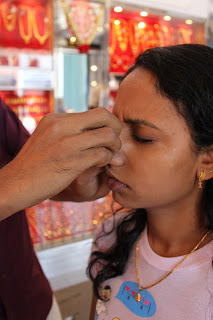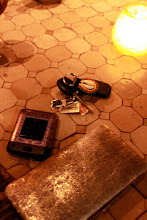I had no idea what to title this post. "I Got My Nose Pierced"? "Getting My Nose Pierced"? "Nose Piercing"? So I called it the most ridiculous (and true) thing I could think of. I do indeed have a new hole in my face. On the right side of my nose, to be exact. My mother tells me that the piercing is in the wrong place on my nose, that it should be a bit lower and more forward. Unfortunately, she [and a nice old lady that we're family friends with, and my gay best friend, all three of whom told me my nose was pierced in the wrong spot as soon as they saw it] is completely right. But since my piercing was four (or five, depending on which side of the international date line you were standing on) days old by the time my mom pointed out the problem, there was nothing I could do about it. It's all a bit upsetting, since I was really pleased whenever I saw my nose ring in the mirror before the misplacement was pointed out, but now when I see it I can't help wishing it were shifted slightly. I have to get used to it though, and I'm sure I will, because I'm stuck with this piercing for the rest of my life. All in all, I'm pleased; it looks much better than I thought it would. A recap of the experience:
I got my nose pierced in Little India in Singapore, at an Indian jewelry store called [charmingly] Ani Mani Porchalai. [and by charmingly, I meant slightly ridiculously] I stayed with my closest girlfriend from college and her family while I was in Singapore, so both she and her mother accompanied me to the jewelry store. The whole process was relatively unceremonious: we walked in, said I wanted to get my nose pierced, and the jeweler called over the resident piercer. I chose the nose ring I wanted (small, gold, with a diamond-looking stone) The piercer dude asked me which side, I said right, and he marked the spot with a pen [ah if only I had asked him to move it!] and then handed me a Q-tip dipped in anesthetic ointment to rub on the spot. I rubbed, the jeweler told me to close my eyes and brace myself, and the piercer began to pierce my nose. Without a piercing gun. Instead, he stuck a sterilized needle into the stem of my nose ring, and proceeded to poke a hole in my nasal cartilage with said needle. Since the outside of my nose was anesthetized, it felt at first like an ant bite, a prick:

[my friend has a fantastic SLR camera, so she took pictures for me]
But as the needle penetrated the skin and began going through my actual nose, I started to feel the pain a bit more:

It definitely got to a point where I was thinking "when is it going to end?!" as he was piercing. I'm proud that I didn't scream, but I definitely whimpered a little. Getting your nose pierced is no joke. It hurts. Thankfully, the pain of piercing is the worst of it; during the recovery period, the area around the piercing was a bit swollen and tender, but I was pretty much completely healed in four days. So overall: yay! I got my nose pierced! I survived, and it looks pretty good. Sadly, the nose piercer guy definitely said that I have a "thick nose" and it was a bit difficult to pierce. FML, a little. For most of my life, I've had a bit of a complex about my nose being large, so it was kind of the cherry on top of the sundae (in a non-good way) to hear that. I wasn't really hurt; I mostly found it funny, in a sort of wry way. I mean how many people are told that their nose is thick? Ha.
Aaand hopefully this is the first of many posts about my Asia trip now that I'm back home. Hope you found this one entertaining!
